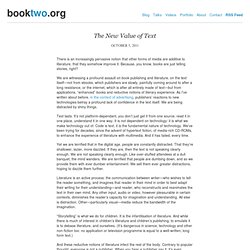

The End of Borders and the Future of Books. The New Value of Text. There is an increasingly pervasive notion that other forms of media are additive to literature, that they somehow improve it.

Because, you know, books are just telling stories, right? We are witnessing a profound assault on book publishing and literature, on the text itself—not from ebooks, which publishers are slowly, painfully coming around to after a long resistance, or the internet, which is after all entirely made of text—but from applications, “enhanced” books and reductive notions of literary experience. As I’ve written about before, in the context of advertising, publishers’ reactions to new technologies betray a profound lack of confidence in the text itself.
We are being distracted by shiny things. Text lasts. Yet we are terrified that in the digital age, people are constantly distracted. “Storytelling” is what we do for children. And these reductive notions of literature infect the rest of the body. Added to the velocity of the new text is its sociability, its connectivity. Sam Harris on the Future of the Book. Bestselling author Sam Harris explains his current solution to the strange new media world—and why he’s publishing short ebooks.

Writers, artists, and public intellectuals are nearing some sort of precipice: Their audiences increasingly expect digital content to be free. Jaron Lanier has written and spoken about this issue with great sagacity. You can purchase his book, which most of you will not do, or you can watch him discuss these matters for free. The problem is thus revealed even in the act of stating it.
How can a person like Lanier get paid for being brilliant? Where publishing is concerned, the Internet is both midwife and executioner. When I published The End of Faith in 2004, I created a website as an afterthought. Journalism was the first casualty of this transformation. My friend Christopher Hitchens is a writer of truly incandescent prose whose career has been forged almost entirely in the context of print journalism.
Related difficulties are now looming for books. McSweeney's Internet Tendency: The Future of Books. 2020: All Books Will Be Cross-Platform and Interactive.

Future “books” will be bundled with soundtracks, musical leitmotifs, 3-D graphics, and streaming video. They’ll be enhanced with social bookmarking, online dating, and alerts from geo-networking apps whenever someone in your locality purchases the same book as you— anything so you don’t have to actually read the thing. Authors will do their own marketing, the reader will be responsible for distribution, the wisdom of crowds will take care of the editing, and the invisible hand of the market will perform the actual writing (if any). Writers will respond either by going viral or by going feral. 2030: All Books Will Be Crowdsourced and Cloud-Based. Novelists will start out designing their characters in the form of sets of vinyl figurines. 2040: Authors Will Become Like Tamagotchi. 2050: Analog Reading Will Be Digitally Simulated. 2060: Physical Books Will Make a Comeback in Annoying Contexts. 2070: We Will All Become Cyborgs.